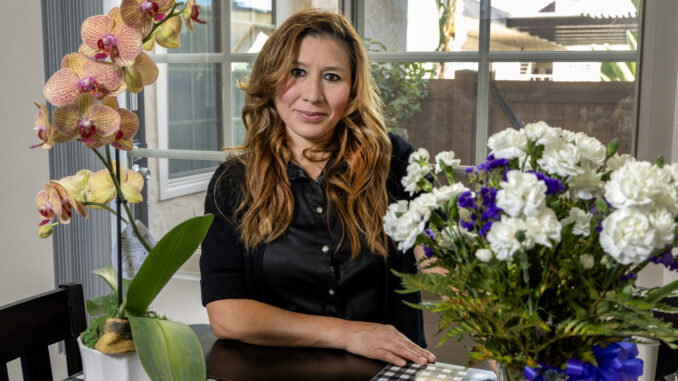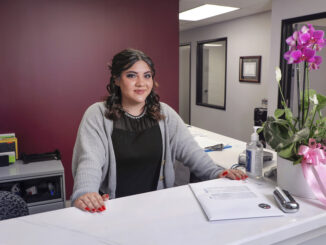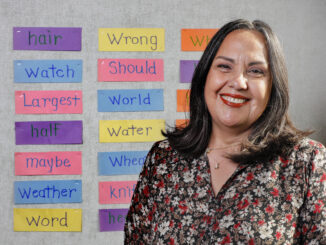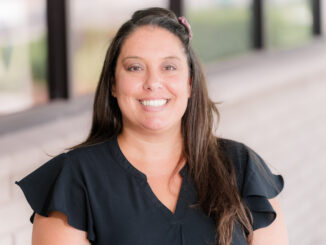
After a long and difficult journey, immigrant caregiver finds support, pathway to education through union/college partnership
by Dorsey Griffith
Roxana de Hernandez is an in-home caregiver for her 20-year-old daughter, who is non-verbal and has autism. Her second job is caring for an 81-year-old woman who lives 20 miles away, and who she reaches by bus. On top of that, de Hernandez, who speaks Spanish, takes English classes and finds additional time for volunteer work.
But the 42-year-old does it all with joy and immeasurable gratitude for the help she’s received from the United Domestic Workers Resource Center, a program of the United Domestic Workers (UDW) union, which partners with the California Community Colleges (CCC) Chancellor’s Office to provide support and case management to members. The program meets the goals of Vision 2030, a collaborative action plan that provides focus, equity and direction to California’s community colleges.
“She wants to do better for herself and her children and is willing to do whatever it takes to learn English, get her GED and a better job to live here and communicate with people in San Diego,” says Crystal Castro, the resource center’s associate director of care management services and de Hernandez’s caseworker. “She’s a fighter. She came here with nothing.”
“When I was young, teachers told me I was very intelligent, but my father’s wife wouldn’t send me to school. I wanted to go.”
Roxana de Hernandez, UDW Member and Southwestern College Student
In addition to free tuition for English classes, the CCC program has helped her with an unexpected rent increase and the cost of attending a conference for families with disabled children.
Asked to talk about her history, de Hernandez’s voice quivers as she recounts in Spanish a life of abuse, violence and terror in San Salvador, beginning as soon as her mother abandoned her at just 15 days old. Her childhood was marked by frequent beatings, delivered by her stepmother and father. Often hungry, she remembers wandering into the streets hunting for fruit growing on trees. More than once, she says, her stepmother tried to poison her with weedkiller, making her so sick she had to be taken to the hospital. Her stepmother said de Hernandez had poisoned herself intentionally, and for that, she was given another beating from her father.
De Hernandez escaped her home at age 13, lived on the street and, for a while, with an older man for whom she worked for a year until he, too, became abusive. She barely scraped by cleaning houses and doing other odd jobs for the next few years. She had a baby at age 18 and twin daughters four years later but has had no support from their fathers. Caritas El Salvador, a Catholic humanitarian organization that helps the most marginalized people in her community, helped her get refugee status and asylum in the United States in 2020.
De Hernandez could only bring the younger twins with her; her eldest, Patricia, is now 24, a mother, and lives in San Salvador.
Since arriving in the San Diego area in 2020, de Hernandez has focused on settling the twins. Kelly attends high school, and de Hernandez takes care of Karen at home through the state’s In-Home Supportive Services program, which pays caregivers. While challenging, her other job of caring for the older woman is a gift, she said.
“The señora tells me I am someone with a lot of patience,” she said. “I tell her that I love my work, so it’s fine.”
De Hernandez attends vocational English classes at Southwestern College, which is her first real educational opportunity, thanks to the community college partnership with the union.
“When I was young, teachers told me I was very intelligent, but my father’s wife wouldn’t send me to school. I wanted to go.”
Today, at 42, she yearns to learn and is grateful for the opportunity she’s been given. “I want to do what I didn’t do since I was a child,” she says. “I want to learn English and get my GED. Then I want to study so that I can help children with disabilities in schools.”
De Hernandez doesn’t think of her life as stressful. “I am happy,” she said. “The dreams I had as a child—now I feel I can reach them. I want to reach everything.”
For more info about the United Domestic Workers Resource Center, go to www.udwresourcecenter.org. To learn more about the California Community Colleges Chancellor’s Office and Vision 2030, visit www.cccco.edu/About-Us/Vision-2030.



